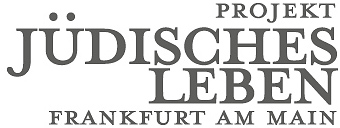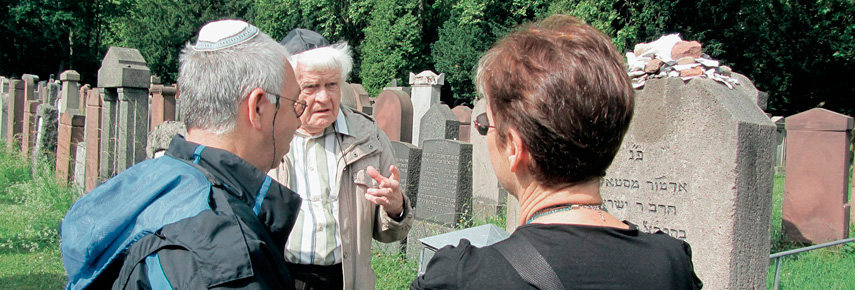Biographical Notes
Name:
Estelle Dzienciol, née Bergmann, born in Australien
Father:
Leopold Bergmann, born in 1921 in Uhlandstraße, Frankfurt Ostend
School of Father:
Juedische Volksschule im Röderbergweg
Emigration:
1937 to Australien
Father’s Sister:
Nora Frankel, née Bergmann, born in 1926, emigrated in a Kindertransport to England in 1938; followed her brother to Australia after the war.
Grandparents:
Had a kosher restaurant in Frankfurt. Both deported and murdered.
Sources:
Projekt Jüdisches Leben in Frankfurt (PJLF): Correspondence with an talk to Ralph Penglis and Estelle Dzienciol
PJLF: Recording of the meeting at Gagern-Gymnasium
Vertriebene zu Gast. Flüchtlinge und deren Kinder besuchen Frankfurt, FAZ vom 01.06.2012
Photos und Documents: Estelle Dzienciol and Ralph Penglis
Photos: Heinrich von Gagern-Gymnasium, Iris Hofmann, Angelika Rieber
Text:
Marianne Karpf
Translation:
Geoffrey Roberts
Georgette Brock
The Bergmanns, who lived together with their two children Leopold and Nora in the Uhlandstrasse in the Frankfurt Ostend, had to come to a heartbreaking decision which saved their children’s lives. Leopold was lucky, he could emigrate to Australia in 1937 at the age of 16. His sister Nora came, at the age of 12, to England, joining a Kindertransport in 1938. Parents and children never met again. Both parents were deported and murdered. Leopold arrived in good condition in Australia and found himself a new home. Estelle is his daughter. Nora followed her brother to Australia after the war.
Life won (in a lottery)
Estelle Dzienciol, née Bergmann
Mrs. Dzienciol was born in Australia, because her father, Leopold Bergmann, born in 1921 in Frankfurt at Uhlandstrasse had won in a lottery in 1937. The Jewish community in Brisbane/Australia had collected money in order to enable two Jewish school children, a boy and a girl, to escape from Germany and to live with them in Australia. Estelle’s father who attended the Israelitische Volksschule at Roederbergweg drew the winning lottery ticket together with a girl from the girls’ school.
The two of them started the journey together, but the girl died from pneumonia during the passage. The departure from Germany had already been dramatic. The Gestapo (secret police) ordered the conductors to tell them which passengers were Jewish. These were then dragged out of the train. When the conductor came to the two teenagers, he did not name them. After the train had crossed the border to the Netherlands, Estelle’s father thanked the conductor and asked him for his address in order to thank him more formally at a later date. Leopold Bergmann was 16 years old when he arrived in Brisbane. The community gave him a place to live and a job.
The sister of Estelle’s father, Nora Frankel, née Bergmann, survived as a Kindertransport child in England. Mrs. Dzienciol read from her aunt’s memories titled “I came alone” about her experiences in school, the November pogrom of 1938, her farewell from Frankfurt and her trip in the Kindertransport two months before the beginning of the war. Nora Bergmann was twelve years old at that time. In the late forties Leopold Bergmann managed to get his sister over to Australia.
And this is what Mrs. Dzienciol read:
“I came alone
My school was about ten minutes walk away from home. I attended Israelitische Volksschule which was a Jewish girls-school. We had about thirty-five in the class but the number soon dwindled as from 1938 we noticed that every week one of the girls would leave. As things got worse more teachers left and more classes were grouped together. On our way home from school the Nazi kids used to wait for us and throw stones at us. One time that I will never forget is when the Nazi kids waited outside the school and as we walked down to the corner they had a bucket of salt water which they threw in our face and nearly blinded us…
On Kristallnacht the 10th November, 1938 my mother sent me shopping on my own. On the way back I saw a big crowd outside the Shule (Synagogue) – shouting – laughing – and yelling out ‘The Shule in on fire!’.
They were throwing the Sefer Torah in the air and having a great time breaking windows and destroying all they could get hold of.
I had to walk past this and I was terribly upset that I came home crying.
After being home a little while we could hear glass smashing and people shouting ‘Jews get out’. My mother and I were very frightened and we hid in a corner under the table. On the ground floor were Jewish people who had everything broken and smashed up. Non-Jewish people were on the first floor and they called out to the Nazis: ‘There are no more Jews here. Get out!’ This saved us from being hurt and having our things destroyed, but we were so frightened that we kept on hiding.
When all was quiet we went downstairs and saw the windows smashed, everywhere homes ransacked, furniture broken up, people screaming not really knowing what was happening.
After the November events the Jewish public school amalgamated with the girls-school. The Classes in the Hirsch-Realschule became smaller and smaller as so many children were being transported to England.
By 1939 things were so bad that no one was game to go out at night time…
I came out on one of the last Kindertransports just two months before the war broke out.
Mother took me to the station, Hauptbahnhof in Frankfurt. I can still see myself standing there, saying good-bye to my dear mother. I feel blessed that God constantly helped and guided me but I will never forget the feeling and heartbreak and the clinging together with my dear mother for the last time. At the age of thirteen I boarded the train and never felt so alone.
Then came the final inspection of our documents by the ‘SS’-men whose menacing look left no doubt in our minds as to what would have liked to do to us.
After crossing the Dutch border the kind smiling ticket collectors who came into the compartment ensure that nothing would happen to us from then on.
It was all behind us. We were free!
Only our unfortunate parents were left to face it all.”
Nora Bergmann never saw her mother and father again.
The grandparents of Estelle Dzienciol were deported and murdered. Mrs. Dzienciol found their names on the memory wall of the old Jewish cemetery at Battonstrasse. The house at Uhlandstrasse 38 in which her father lived is still there and Estelle Dzienciol was very pleased that the present owners asked her in.
In the talk at the school Estelle Dzienciol said that she had come to Frankfurt with mixed feelings but that she had good feelings towards Germany and the Germans now because they had been frank and friendly to her. She was grateful for the invitation to Frankfurt and hoped that her children could also participate in such a program.
Many questions and a kosher snack: School visit at Gagern Gymnasium
The meeting at Gagern Gymnasium took place with a twelfth grade class, but some ninth graders had shown such an interest that they were allowed to participate, too. Mr. Penglis had brought the family record (Stammbuch) and a vaccination certificate with him which he passed around. Beforehand the students had prepared questions to ask the visitors which now helped to get a lively discussion. Asked whether there were differences in the stories of the parents and grandparents, Max Dzienciol said that in general people started to talk about that period rather late. Those who had had their own experiences, talked very little about them, but his generation had had certain presentiments. Yet, it was only in the past fifteen or twenty years that people spoke more about it.
Estelle’s aunt, for example, wrote about her experiences and thus threw off the burden she had carried with her all along. Asked about the final reason for emigration, Ralph supposed that it had been fear which caused his then seventeen-years-old mother and his two years older father to escape. But there had been several things that came together. Ralph knew, for instance, that his mother’s best friend, who was not Jewish, did not want to have anything to do with her any more.
The conditions of life in Australia during World War II were hard. Max Dzienciol reported that his father, a Polish Jew, was considered a “friendly alien” and his mother, a German Jew, an “enemy alien”. It did not seem to make any difference that they had emigrated from Germany because of the fact that they were Jews. Ralph reported that his mother was exposed to racist comments in the bus because she spoke English with a German accent, and that for himself as a boy from Germany life in school was not easy either. One girl student asked whether the past had an influence on their present life, and the answer was “Yes, of course”.
Australia has a Shoa Memorial Day. Many young Australians go to Israel after having finished school. From there they take part in tours to Auschwitz or participate in “The March of the Living”. Max Dzienciol said that the second generation in Australia had close relations with Europe. The visitors never asked their parents which country they considered home, but they know that their parents were glad to be safe in Australia.
After the talk in the classroom, all guests were welcomed by the director with a toast of kosher champagne and a kosher snack which was very much appreciated by the visitors. The guests expressly thanked the school for this gesture and the hospitality they had enjoyed at Gagern Gymnasium.

